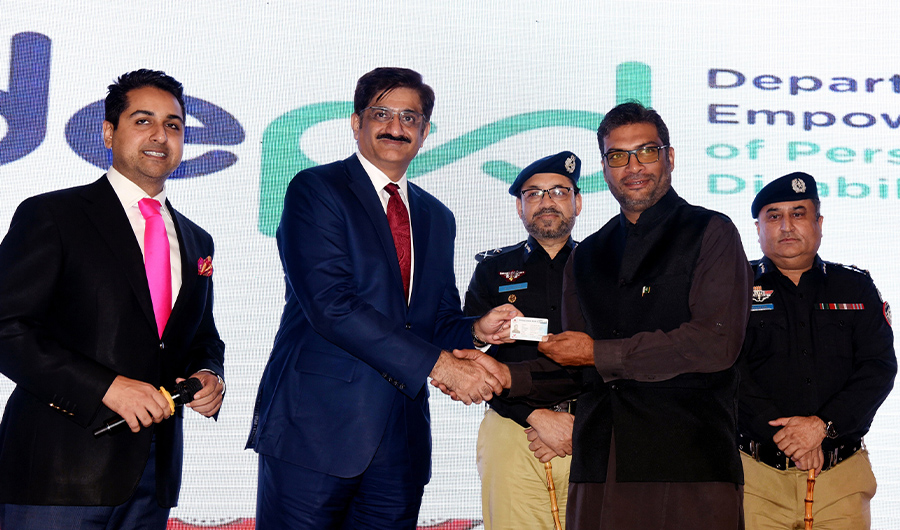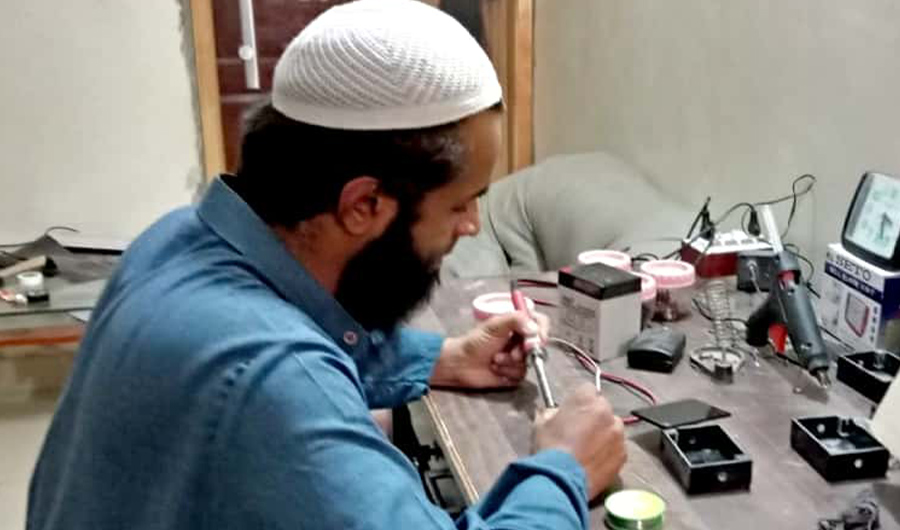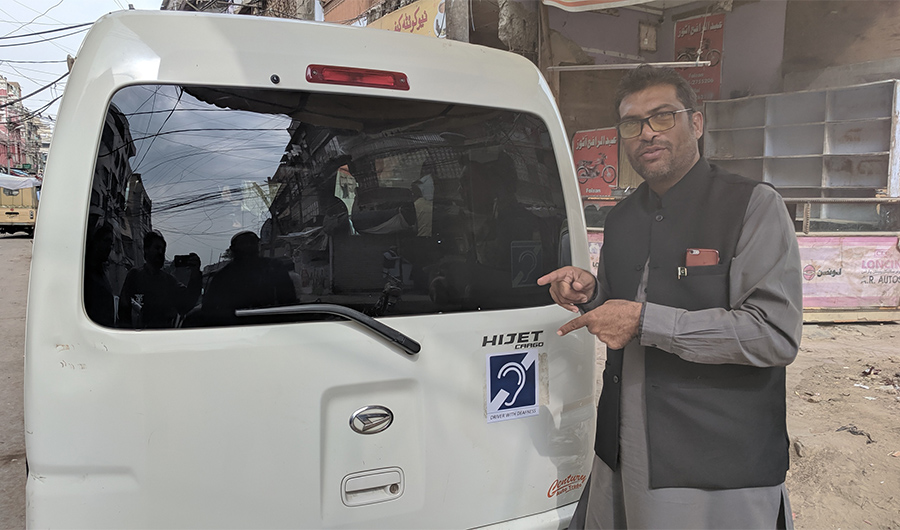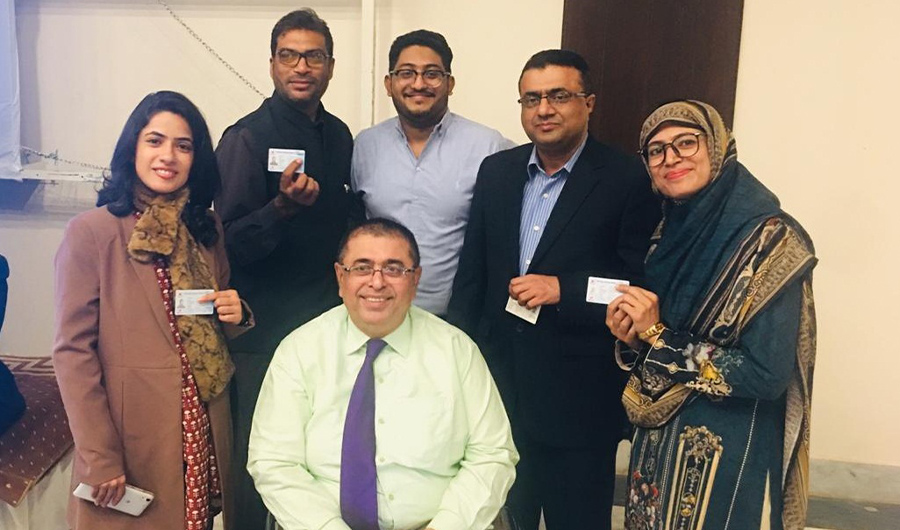KARACHI: In a first, four people with hearing impairment got their driver’s licenses in Pakistan from the chief minister of Sindh province on Tuesday.
“The provincial administration of Sindh deserves the credit for this, especially its Department of Empowerment of Persons with Disabilities (DEPD) that made us the first Pakistanis to secure our legal right to drive,” 42-year-old Mansoor Abdul Majeed, who works at a local factory and received his license from the chief minister, told Arab News on Friday.
However, he pointed out it was not an easy task to reach this stage, adding that his community members had to invent a Traffic Surrounding Notifier (TSN) system to convince the authorities.

Chief Minister Syed Murad Ali Shah presents driver’s license to Mansoor Abdul Majeed, a person with hearing impairment, at the CM House in Karachi on December 3, 2019. (Photo courtesy of CM House, Karachi)
“I was fighting for this right for several years,” he said. “The traffic police told us that we could not drive since we could not hear anything. After getting disappointed by the license branch, I discussed the idea with my friend, Irfan Sharif, who invented the device which we used to convince the authorities.”
“When demonstrated, the DIG of traffic police was surprised,” said Majeed, who also founded a community group, Media Deaf Karachi (MDK), to resolve the problems of his community members.

In this undated image, Irfan Sharif, who suffers from hearing impairment, can be seen working on the Traffic Surrounding Notifier (TSN) device which made it easier for the authorities to issue driver’s licenses to people suffering from hearing impairment. (Photo supplied)
Sharif, a school teacher and part-time programmer who was born with hearing impairment, started working on the idea of developing a device that could help fulfill the legal requirements of driver’s license in 2017.
He found a gadget that vibrated and flashed when his baby cried and decided to turn it in the traffic surrounding notifier system.

The light of the Traffic Surrounding Notifier system blinks on the dashboard of Mansoor Abdul Majeed’s car on December 6, 2019. (AN photo)
“Whenever there is any sound signal, such as a horn or an ambulance siren, a light blinks on the dashboard of the car or motorbike and the driver can look into the rearview or side mirrors and act accordingly.”
A non-governmental organization, named Danish Kada, and Zaigham M. Rizvi extended the financial help to install the device in 25 cars, he said.
According to the World Health Organization, Pakistan has a population of 30 million people with disabilities. However, there are no official statistics available on the subject.
The 1998 census claimed that differently abled people constituted about 2.49 percent of the country’s population. In the 2017 census, that number was said to be 0.48 percent.
“Not only the persons with disability took it as a joke, but the Supreme Court, which has been hearing a constitutional petition, called the census count flawed and ordered a fresh survey of 300,000 households across Pakistan to estimate the number of persons with disabilities,” Ghulam Nabi Nizamani, director of the DEPD, told Arab News.

Mansoor Abdul Majeed is pointing toward a sticker on his vehicle in Karachi on December 6, 2019, indicating that it is driven by a person with hearing impairment. (AN photo)
The survey is yet to be conducted.
Meanwhile, Chief Minister Murad Ali Shah told Arab News that his administration was doing its best to educate people with physical impairments, adding it had converted schools of special children into rehabilitation centers.
“I have allocated five percent quota for differently abled persons in government service,” he said. “This is the reason that our government has created a separate full-fledged department so that differently abled people can be empowered.”
Meanwhile, people with hearing impairment are excited about the new development.

(Left to right) Farah Mughal, Mansoor Abdul Majeed, Ali Akber Noonari and Farah Naz can be seen in a group photo with Ghulam Nabi Nizamani, director of the Department of Empowerment of Persons with Disabilities, after obtaining their driver’s licenses at the Chief Minister House in Karachi on December 3, 2019. Nizamani, who works with the Sindh administration, is also a differently abled individual. (Photo supplied)
“We have been driving cars for years. But now we will be driving them legally. The development will help us reduce our dependence on others,” Majeed said, urging the traffic police to issue licenses for motorcycles as well since that would benefit a large segment of his community members.
“We are not inferior to anyone,” he said. “We need our due rights. I am happy that we live in a province which realizes its responsibility toward the differently abled people.”


















